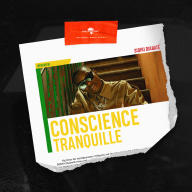The Diabaté family has produced griots -- a sort of hereditary bard, poet, or musician -- for many generations, a large number of them gifted kora players. Sidiki's grandfather, a Malian legend, helped bring the instrument into the modern world by making the first kora recording in 1970, while his father Toumani helped popularize the instrument's unique sound around the world through his many acclaimed albums and collaborations with artists outside of African music. For his part, Sidiki began learning the family instrument as a boy, though instruction from his father was scant, leaving the young griot instead to chart his own creative course and develop his own influences. Growing up in the 1990s and early 2000s, he balanced a love of kora tradition with the vibrant contemporary music he heard around him, from hip-hop and R&B to electronic and various facets of Afro-pop.
The early part of Sidiki's career was more focused on hip-hop production, often with rapper and fellow griot Iba One, though he also established himself as a skilled kora player. In 2014, Sidiki and his father teamed up to record a beguiling collection of father-son kora duets simply titled Toumani Sidiki. Honoring and improvising on ancient kora pieces, the critically lauded album served to introduce Sidiki to the larger world music community. He made his own solo debut in 2016 with Diabateba Music, Vol. 1, a more Afro-pop-leaning album that showed his skill as a singer, songwriter, and producer. The following year, Sidiki and his father joined French rock musician -M- to form the trio Lamomali, releasing a self-titled album. Returning to solo work, he again combined R&B and hip-hop elements with occasional traditional flourishes on 2019's Béni. Another single, "Conscience tranquille," appeared in 2020. ~ Timothy Monger, Rovi













